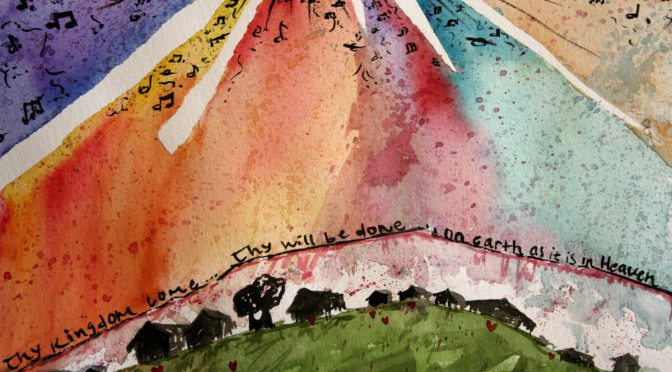Caitlin Trussell with Augustana Lutheran Church on February 17, 2021
Livestream online worship at 7 p.m. this evening can be found on Augustana’s YouTube page here.
[sermon begins after Bible reading]
Matthew 6:1-6, 16-21 [Jesus said to the disciples:] 1“Beware of practicing your piety before others in order to be seen by them; for then you have no reward from your Father in heaven.
2“So whenever you give alms, do not sound a trumpet before you, as the hypocrites do in the synagogues and in the streets, so that they may be praised by others. Truly I tell you, they have received their reward. 3But when you give alms, do not let your left hand know what your right hand is doing, 4so that your alms may be done in secret; and your Father who sees in secret will reward you.
5“And whenever you pray, do not be like the hypocrites; for they love to stand and pray in the synagogues and at the street corners, so that they may be seen by others. Truly I tell you, they have received their reward. 6But whenever you pray, go into your room and shut the door and pray to your Father who is in secret; and your Father who sees in secret will reward you.
16“And whenever you fast, do not look dismal, like the hypocrites, for they disfigure their faces so as to show others that they are fasting. Truly I tell you, they have received their reward. 17But when you fast, put oil on your head and wash your face, 18so that your fasting may be seen not by others but by your Father who is in secret; and your Father who sees in secret will reward you.
19“Do not store up for yourselves treasures on earth, where moth and rust consume and where thieves break in and steal; 20but store up for yourselves treasures in heaven, where neither moth nor rust consumes and where thieves do not break in and steal. 21For where your treasure is, there your heart will be also.”
[sermon begins]
A couple of months ago, I preached about the choices we make about who we listen to in books, movies, politics, etcetera, and whether or not the voices we listen to point us to the light, to the voice of Jesus – a voice that promises grace, challenge, struggle, hope, and love of God, self, and neighbor.[1] A couple of days later, a parishioner emailed a recommendation for a favorite book series by Louise Penny.[2] Mysteries about the “light and dark in each person, love of family and community, laced with humor” went the email. Long story short, I’m on book seven. In the novels, Chief Inspector Gamache leads a crack team of homicide detectives. More importantly, he mentors them, teaching them the importance of using four key phrases, “I don’t know. I need help. I’m sorry. I was wrong.”[3] These four phrases bubble up in the series to consider the characters’ motivations and behaviors. The phrases are a good summary of Ash Wednesday too – I don’t know, I need help, I’m sorry, I was wrong. At least, it’s a good summary of the human side of the equation on Ash Wednesday.
It’s the human side of the equation that Jesus challenged his disciples about in the Gospel of Matthew reading. He challenged their motivations and behaviors as he told them not to engage in hypocritical rituals, practicing their piety on street corners in order to be seen by other people.[4] One sure way to make sure that’s absolutely not the case is to practice the rituals privately as Jesus then encouraged them to do. However, Jesus does assume that his disciples will give alms, pray, and fast. He said to the disciples, “When you give alms…; When you pray…; When you fast…” He reassured them that in their private moments of self-discipline and ritual piety of giving alms (also known as sacrificial giving), praying, and fasting, that God was with them – for which we can thank the grown-up bearded Jesus in these physically distanced times. We’ve relied heavily on God’s promise of presence in so many new and different ways over the last year.
A year ago, I’m not sure I would have believed you if you had told me that I’d be standing in front of the church building with Pastor Ann placing ashes on people’s foreheads outside of a worship service. I know I wouldn’t have believed you if you’d told me I’d be presiding over communion via online worship. But if there’s one thing I know about theology, it’s that it’s at its best when it ends up being quite practical. Speaking of practical, anyone wondering what the skipped verses in our reading from the Gospel of Matthew contains? The reading jumps from verse 6 to verse 16 without missing a beat. It’s okay if you’re not wondering about those missing verses. I’m going to let you in on the secret. Jesus teaches his disciples the Lord’s Prayer in those verses. Jesus says to his disciples:
Pray in this way:
Our Father in heaven, hallowed be your name.
Your kingdom come. Your will be done, on earth as it is in heaven.
Give us this day our daily bread.
And forgive us our debts, as we also have forgiven our debtors.
And do not bring us to the time of trial, but rescue us from the evil one.[5]
In the middle of his speech to the disciples about avoiding hypocrisy, Jesus gives them a practical prayer to help them do so – the Lord’s Prayer. We’re immersing in the Lord’s Prayer as a congregation during Lent guided by Rev. Dr. Stephen Cherry’s book, Thy Will Be Done.[6]
The Lord’s Prayer starts in heaven. Heaven, according to the prayer, is the place of God, some would even say the heart of God. Heaven is impossible to imagine although many of us have certainly tried. Time-limited, finite beings cannot comprehend the infinite. It’s a physical impossibility. On Ash Wednesday, we lean into the place of God, into heaven, as we ponder our fragile mortality. “Remember that you are dust and to dust you shall return,” we hear as ashes mark the sign of the cross. The underlying promise is that God breathes life into dust. The cross shaped with ash echoes the cross placed on our foreheads in our baptism. While we’re leaning into the truth of our mortality, we’re also leaning through that mortality into the place of God, into the embrace of God. The cross symbolizes the reality that there is nothing we can do or not do to make God love us any more or any less. This means that when we take our last breath, God’s embrace holds us in heaven, in the place of God. This is God’s resurrection promise through the cross of Christ for our death someday, whenever our someday comes. But this isn’t only about someday.
Jesus says to his disciples, “Do not store up for yourselves treasures on earth, where moth and rust consume and where thieves break in and steal; but store up for yourselves treasures in heaven where neither moth nor rust consumes and where thieves do not break in and steal…For where your treasure is, there your heart will be also.”[7] Your heart will be in heaven, in God’s place, in God’s heart. Not only someday. TODAY. What are the treasures of heaven? Compassion, mercy, grace, forgiveness, generosity, and more. Treasures of heaven are the things that Jesus spends so much time challenging his listeners about in scripture. Practical things that we participate in right now. Or maybe they’re impractical. Not sure. We can argue about that another time. Regardless, treasures of heaven are unearned, undeserved, and permanent. They do not fade away and cannot be taken away. They are eternal. They are of heaven.
God’s promise, God’s side of the equation on Ash Wednesday, frees us into the challenges that Jesus gives his disciples, the challenges we take up today, continue through the six weeks of Lent, and in our lives of faith year-round. A challenge of humility when we say, “I don’t know.” A challenge of imperfection when we say, “I need help.” A challenge of repentance when we confess to God and each other, “I’m sorry, I was wrong.” We’re free to tell the truth because God promises us a place in the place of God, in heaven, today and someday. Thanks be to God, and amen.
__________________________________________________
[1] Caitlin Trussell. Sermon: “World Building with Light” with Augustana Lutheran Church on December 13, 2020. http://caitlintrussell.org/2020/12/13/world-building-with-light-john-6-8-19-28/
[2] Louise Penny official site – https://www.louisepenny.com
[3] Louise Penny. Still Life (New York: St. Martin’s Press, 2005.), 84.
[4] Matthew 6:1
[5] Matthew 6:9-13
[6] Stephen Cherry, Dean of King’s College Cambridge. The 2021 Lent Book: Thy Will Be Done (London: Bloomsbury Continuum, 2021).
[7] Matthew 6:19-21


![Eating Is A Radical Act [OR The Lord’s Prayer: Give Us This Day Our Daily Bread] Luke 12:22-34, Isaiah 58:6-11a, Psalm 107:1-9, 1 Corinthians 10:16-17](http://caitlintrussell.org/wp-content/uploads/2017/08/o-BABIES-EATING-facebook.sermon-caitlin-trussell-672x372.jpg)

